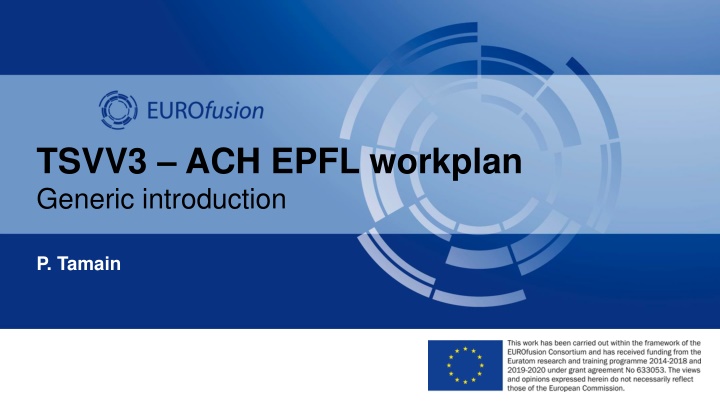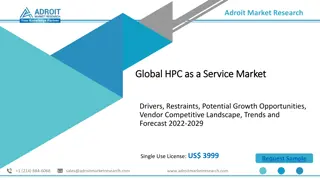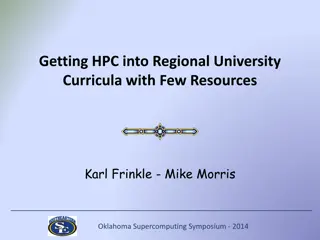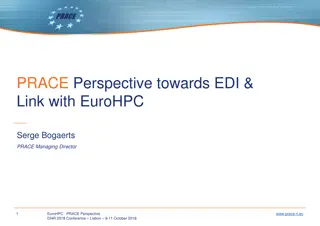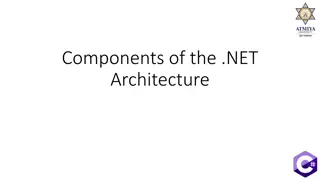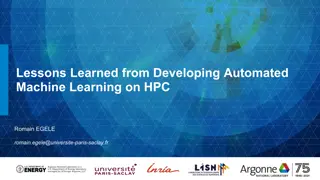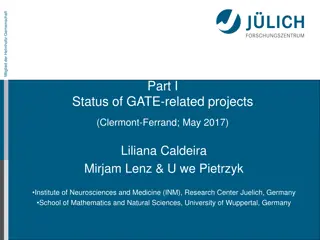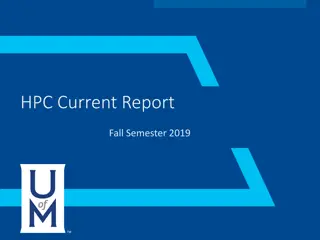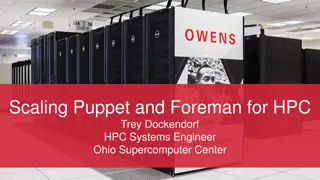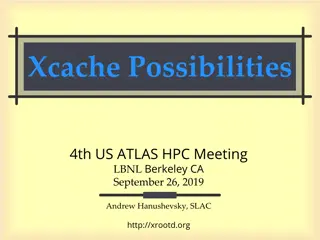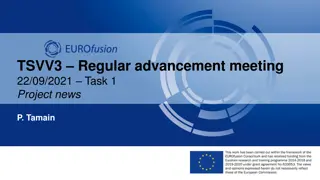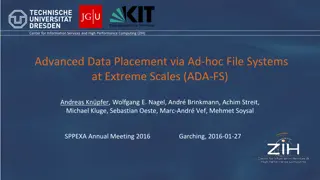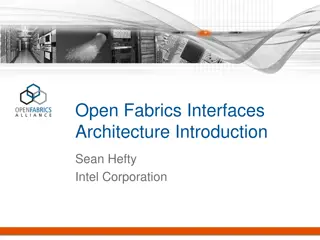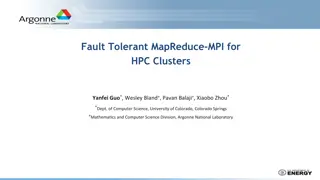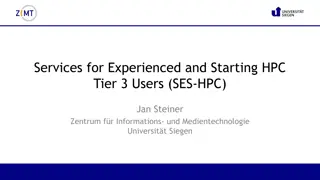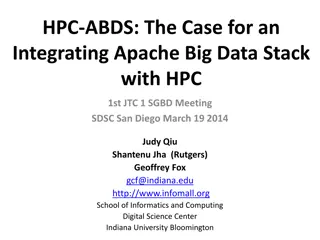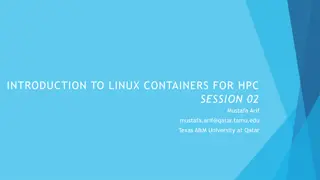Optimizing Code Performance for HPC Applications
Define and apply performance models for code optimization on modern HPC architectures, focusing on tasks like Poisson solver optimization, code-dependent optimization, and neutrals treatment. Evaluate scaling potential and efficient implementation options.
Download Presentation

Please find below an Image/Link to download the presentation.
The content on the website is provided AS IS for your information and personal use only. It may not be sold, licensed, or shared on other websites without obtaining consent from the author.If you encounter any issues during the download, it is possible that the publisher has removed the file from their server.
You are allowed to download the files provided on this website for personal or commercial use, subject to the condition that they are used lawfully. All files are the property of their respective owners.
The content on the website is provided AS IS for your information and personal use only. It may not be sold, licensed, or shared on other websites without obtaining consent from the author.
E N D
Presentation Transcript
TSVV3 ACH EPFL workplan Generic introduction P. Tamain
ACH support in TSVV3 project Task Description Topic 2021 2022 2023 Poisson solver optimization, including porting to GPU HPC 0.50 ppy 0.50 ppy 0.50 ppy Definition of performance model and application to existing codes HPC 0.25 ppy 0.25 ppy 4 EPFL Optimization of kinetic neutrals treatment HPC 0.1 ppy 0.50 ppy 0.50 ppy Code-dependent optimization HPC 1 ppy 1 ppy 1 ppy TOTAL task 4 1.6 ppy 2.25 ppy 2.25 ppy Implementation of IMAS compatibility for IO in contributing codes Integ. Model. 0.50 ppy 8 Repository and Continuous Integration environment setup and maintenance Data Manag. 0.50 ppy 0.25 ppy 0.25 ppy 9 TOTAL 2.6 ppy 2.5 ppy 2.5 ppy Patrick Tamain | TSVV3 ACH-EPFL meeting | 27/08/2021 | Page 2
Performance model definition and application Targets: Define performance model (e.g., roof-line model) for evaluation of code performances Apply it to existing codes to evaluate algorithmic efficiency and guide rationalization of effort beyond 2023 Resources 2021-2022: 3 pm => 0 pm Task fully postponed to 2023 following resources reduction priority given to improving codes for early return to WPs Patrick Tamain | TSVV3 ACH-EPFL meeting | 27/08/2021 | Page 3
Code-dependent optimization (1) ITER ~ 800m3 ~ x400 in plasma volume ~ x4 in magnetic field amplitude ~ x1600 in resolution ~ x35 in number of ion species (vs pure D) JET ~ 80m3 WEST ~20m3 AUG ~13m3 TCV ~1.8m3 Current capabilities Patrick Tamain | TSVV3 ACH-EPFL meeting | 27/08/2021 | Page 4
Code-dependent optimization (2) Targets: optimize codes for running on modern HPC architectures to enable larger scale 3D turbulence simulations (memory & time-to-solution) with ITER as main milestone Evaluate scaling potential of discretization and implementation options Resources 2021-2022: 36 pm => 10 pm (with TSVV6 (SOLEDGE3X)) Reduction of ambition in terms of machine size: ITER probably difficult to reach in project span Exact expected task is code specific (presentations after) Patrick Tamain | TSVV3 ACH-EPFL meeting | 27/08/2021 | Page 5
Optimization of kinetic neutrals treatment Targets: Optimization of kinetic neutral treatment to limit overhead w/r to simulations without neutrals 2 approaches to be investigated: coupling TOKAM3X, coupling to EIRENE [D.M. Fan, NME 2019] with EIRENE and method of characteristics Resources 2021-2022: 7.2 pm => 3 pm Need discussion on how to adapt the workplan to such reduction GBS, method of characteristics [A. Coroado, submitted to NF] Patrick Tamain | TSVV3 ACH-EPFL meeting | 27/08/2021 | Page 6
Poisson solver optimization Targets: Reduce bottleneck of elliptic solvers in 3D edge turbulence codes Share approaches and best practices between codes Optimize existing solvers and/or propose innovative approaches (GPU ) Resources 2021-2022: 12 pm => 9 pm Key point is to make sure progress is beneficial to all or at least several codes Dedicated discussion at the end of the meeting on best strategy Patrick Tamain | TSVV3 ACH-EPFL meeting | 27/08/2021 | Page 7
Poisson solver optimization: discussion Proposed actions: 1. Share information about properties and current implementation of elliptic solvers in codes Document to fill by code developers and share with whole team Help to identify key differences and similarities between codes 2. Give relevant resources to ACH team to analyze performances of elliptic solvers Share source code (via access to common repo?) and/or matrices 3. On agreed template problem(s), investigate novel approaches (new libraries, GPU ) Patrick Tamain | TSVV3 ACH-EPFL meeting | 27/08/2021 | Page 9
